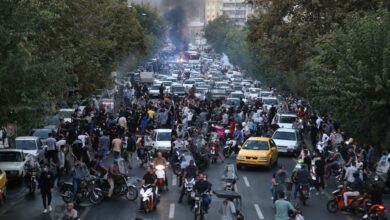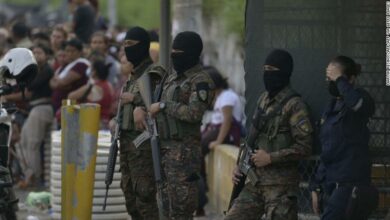Literature has always been fascinated with politics, power and the police, and Egyptian literature is no exception. Police officers have been the antagonists and the protagonists of many masterpieces in the country. Many fiction and nonfiction pieces aimed to look behind the scenes of the life of policemen, whose world is so often a tightly held secret. Sometimes, though, the police will open up themselves.
Mahmoud Qatri is a former Brigadier General and the author of two books about corruption in the Egyptian police force: “E’terafat Dabet Shorta fe Mamlaket al-Ze’ab” (The Confessions of a Police officer in the Kingdom of Wolves) and “Tazweer Dawla” (The Forgery of a Country). The books reveal the daunting reality of a world usually kept hidden from the average citizen, depicting torture, fraudulent elections, blackmail and forged reports.
In “Tazweer Dawla,” he writes that police officers are trained to blindly obey unlawful orders; during big referendums, the government and the ministry distribute police officers at all polling stations to amend the results to the accepted 99.9 percent.
As a student at the Police Academy, you have to let go of your dignity at the door and reclaim it again after 4 years, if you find it, Qatri writes in one of the chapters. Students are subject to personal insults as part of the curriculum, and their blind obedience is demanded. They are trained to be aggressive toward one another, engaging in bloody boxing matches. And, to make matters worse, any education beyond the whim and opinion of individual professors is moot; there is no real interest in the main curriculum of the academy, and violence seems to be lesson number one.
After graduation, you have to be backed up by an important figure in the government to make it in the “Kingdom of Wolves,” as Qatri calls it. Salaries are next to nothing and soldiers abuse their authority and demand bribes or what they refer to as “tea,” considered a token of appreciation and not an illegal inducement.
In “E’terafat Dabet Shorta fe Mamlaket al-Ze’ab,” Qatri reveals that police officers have yearly quotas of arrests and lawsuits, which means they must resort to fabrications and unlawful arrests of innocent and poor people. Torture, he confirms, is a common way to extrat confessions from innocent people. Police resort to beating, electrocution of private parts, and “al-nafkh” (inflating the stomach) while interrogating suspects.
Former police officer Hamdi al-Batran recounts a similar experience in his novel “Youmeyat Dabet fel Arryaf “ (The Diaries of an Officer in the Countryside). The account, which al-Batran claims is fiction, was published in the late nineties. It tells the story of a brigadier in Upper Egypt, when the area was a hub for Islamist militants. The novel depicts many unlawful activities including false arrests and torture, which mirror Qatari’s nonfiction account.
In 2007, former police officer Omar Afifi published “Ashan Matedrebsh Ala Qaffak” (So You Don’t Get Hit on the Back of Your Head). The book offers advice to the citizens of Egypt on how to deal with police officers, unlawful detention and arrests, checkpoints, house arrests and many other illegal and degrading procedures that Egyptians face on a daily basis.
Afifi worked on his book, which he describes (with some irony) as a mini guide for all the procedures and sanctions, for three years. The book was banned by the Ministry of Interior, but copies started to appear on the internet.
After receiving several threats, Afifi fled the country. The rumor is that he is working on a second volume called, “So You Don’t Get Hit on the Head Twice.” Hopefully he will finish it soon.




